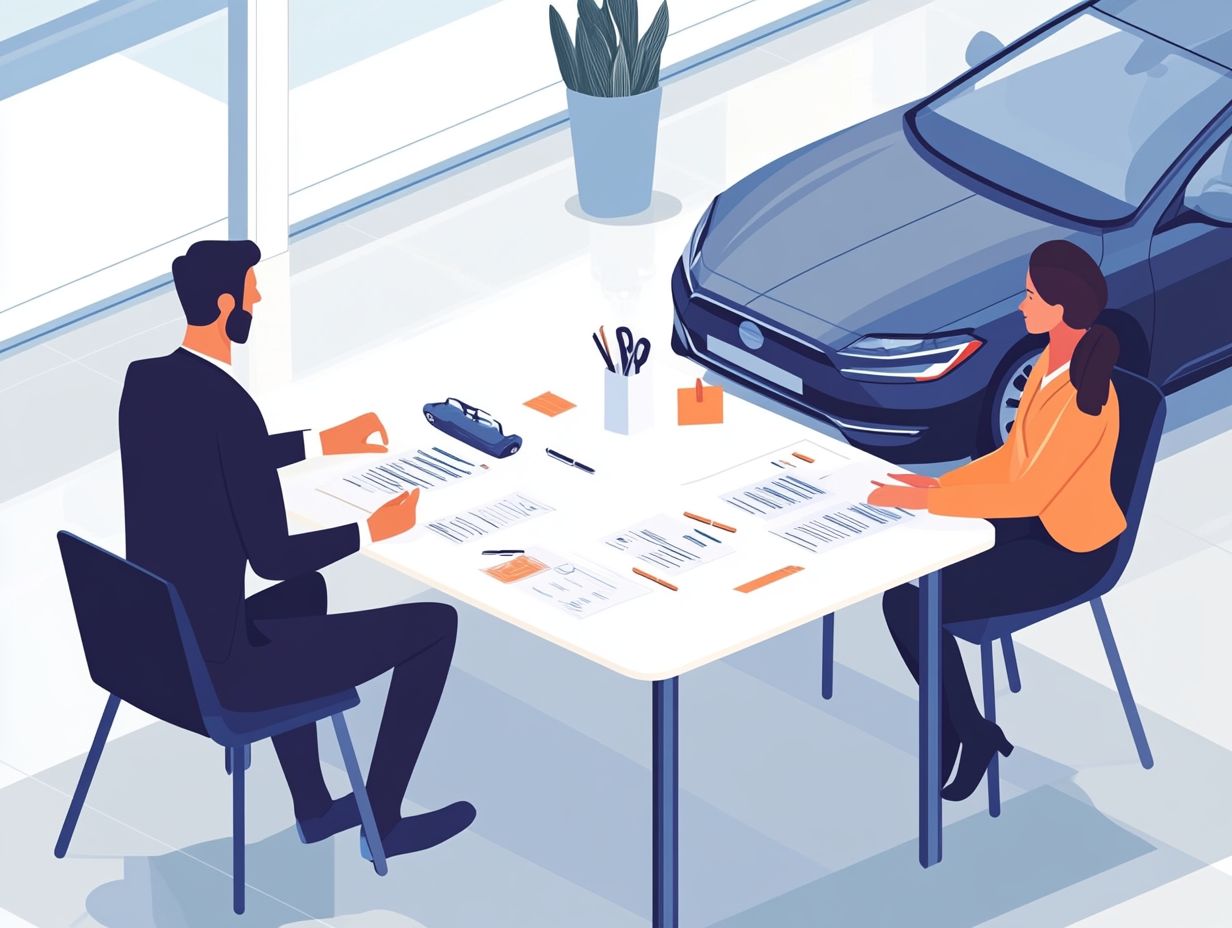Negotiating Tips for Buying a New Car
Buying a new car is undeniably thrilling. However, the negotiation process can often seem intimidating.
This guide equips you with essential strategies and insights to help you secure the best deal possible. You ll explore everything from researching your options and establishing a budget to mastering effective communication and navigating common sales tactics.
Prepare to elevate your car-buying experience and drive away with unparalleled confidence!
Contents
- Key Takeaways:
- Preparing for Negotiations
- Negotiation Strategies
- Tips for Effective Communication
- Dealing with Common Sales Tactics
- Finalizing the Deal
- Frequently Asked Questions
- What are some tips for negotiating the price of a new car?
- How can I negotiate a lower interest rate for my car loan?
- Should I negotiate for a trade-in value for my old car?
- What are some common mistakes to avoid when negotiating for a new car?
- Is it possible to negotiate the price of a new car over email or phone?
- Can I negotiate for a lower price even if the car is in high demand?
Key Takeaways:

- Research and set a budget before negotiating to avoid overspending on a new car.
- Use active listening and assertive communication to express your needs and wants effectively during negotiations.
- Recognize and respond to common sales tactics, such as pressure and add-ons, to stay in control of the negotiation process.
Preparing for Negotiations
Preparing for negotiations is a vital step in your car-buying journey, as it equips you with tips for negotiating used car prices and allows you to navigate the process like a seasoned buyer.
You ll want to understand the factors that shape car prices, dealership tactics, and financing options to secure the best deal.
Delve into essential numbers like the Manufacturer’s Suggested Retail Price (MSRP) the price recommended by the manufacturer and additional costs added by the dealership, such as trade-in value and out-the-door price. Utilizing tools like an auto loan calculator can help you estimate your monthly payment.
This preparation boosts your confidence and enhances your bargaining power when engaging with car dealers.
Researching and Setting a Budget
Researching and setting a budget before stepping into a dealership is super important. It enables you to determine what you can afford without jeopardizing your financial well-being.
To start assessing the MSRP of your desired vehicle, tap into various online resources for comparison. Remember, it’s not just the MSRP that matters dealer fees can significantly impact your total budget.
Once you ve identified the vehicle you want, consider the trade-in value of your current car. This can be a smart way to offset part of the purchase price. Use an auto loan calculator to explore different scenarios involving down payments and monthly payment options.
Exploring different financing avenues might reveal favorable loan terms that align with your financial goals, paving the way for a smoother purchasing experience.
Understanding Your Needs and Wants
Understanding your needs and wants is essential as a car buyer. It directly influences the negotiation process and helps you establish the upper hand, especially when using strategies for buying new cars online.
By differentiating between essential features like safety and reliability and luxury options, such as leather seats and advanced sound systems, you can create a prioritized list that reflects your true preferences.
This clarity streamlines your search and enables you to negotiate confidently, ensuring your budget remains aligned with market values.
Being well-informed about consumer protection agencies will help you recognize potential pitfalls during the buying journey. This understanding safeguards you as you navigate the complexities of purchasing a car.
Negotiation Strategies
Negotiation strategies are crucial for securing a successful transaction. They provide you with the tools needed to navigate price discussions with car dealerships and can be particularly helpful for first-time new car buyers to maximize your leverage as a buyer.
Building Rapport with the Salesperson

Building a strong rapport with your salesperson can transform your car-buying experience! This crucial negotiation tactic profoundly shapes how you engage throughout the process.
Engaging in open and honest communication fosters an environment where both you and the salesperson feel at ease discussing your needs and expectations.
Active listening means really paying attention to what the other person is saying. This skill is essential because it helps you understand the salesperson’s perspective and builds trust in the interaction.
Acknowledging their expertise validates their role and encourages a spirit of collaboration. Sharing personal experiences or anecdotes makes conversations more relatable and paves the way for smoother negotiations.
When both you and the salesperson feel respected and valued, the process can lead to mutually beneficial agreements that satisfy everyone involved.
Using Your Research to Your Advantage
Using your research effectively during negotiations enables you to challenge a dealer’s pricing and terms confidently.
Presenting compelling evidence about competitive pricing and available dealer incentives articulates a more favorable position. Understanding the market value equips you with insights into what constitutes a fair deal and reveals when dealers may be unjustifiably inflating prices.
Introducing factual data during discussions enhances your credibility and strengthens your negotiation stance. This approach showcases your due diligence and fosters a transparent dialogue, ultimately leading to better outcomes in your negotiations.
Tips for Effective Communication
Effective communication is very important in negotiation. It enables you to articulate your needs clearly while also employing active listening to fully grasp the salesperson’s perspective.
Active Listening and Assertive Communication
Active listening and assertive communication create a space for mutual respect and understanding.
These skills greatly enhance your interactions with salespeople. To practice active listening, maintain eye contact, nod in acknowledgment, and summarize key points made by the other party to show you truly understand. Asking open-ended questions invites further dialogue and demonstrates genuine interest in their perspective.
You can convey assertive communication through clear body language and a steady tone. For example, maintaining an upright posture while using phrases like “I believe” or “I feel” projects confidence without being confrontational. Balancing these techniques fosters a more cooperative atmosphere in negotiations.
Body Language and Tone
Understanding body language and tone is essential in negotiation, as these non-verbal cues can greatly influence how your intentions are perceived.
When you pay attention to your body language and the subtle signals from others, you create an atmosphere of trust and collaboration. A relaxed posture, meaningful eye contact, and a warm tone can project confidence and invite openness, fostering an exchange of ideas that leads to favorable outcomes.
Conversely, closed or aggressive body language combined with a harsh tone can create defensiveness and tension, derailing the negotiation. By being mindful of these crucial elements, you can enhance the atmosphere and pave the way for mutually beneficial agreements.
Dealing with Common Sales Tactics

Navigating the common sales tactics employed by dealerships requires vigilance regarding strategies designed to boost dealer profits. Understanding what to expect when buying a new car and recognizing pressure tactics and enticing add-ons presented during the buying process is fundamental.
Recognizing and Responding to Pressure Tactics
Recognizing and responding to pressure tactics is essential for you as a car buyer to navigate the negotiation process effectively, especially when considering tips for buying new cars during sales events.
Salespeople often leverage urgency or scarcity, pushing potential buyers into making hasty decisions by claiming a deal will expire soon or that a particular vehicle is in limited supply. These tactics can create an atmosphere of anxiety, leading to choices that might not be thoroughly considered.
To counteract these tactics, it s crucial for you to maintain a calm demeanor and pause to evaluate the situation objectively. Reminding yourself of the research you’ve conducted and focusing on your personal needs can help keep emotions in check. This allows you to make strategic decisions rather than succumbing to impulsive reactions.
Handling Add-Ons and Extras
Handling add-ons and extras presented by the dealership requires a careful approach to avoid unnecessary costs and maintain control during your negotiation process.
As a potential buyer, it’s essential for you to identify the common add-ons that may be suggested, such as extended warranties, paint protection, and service packages. By critically evaluating these options, you can determine which extras genuinely enhance the vehicle’s value and which merely inflate the purchase price.
Engaging in thorough research beforehand will illuminate typical dealer fees and highlight any red flags to watch for. This informed perspective will enable you to negotiate effectively, ensuring you only commit to add-ons that provide real benefits tailored to your specific needs.
Finalizing the Deal
Finalizing the deal represents a pivotal moment in your car-buying journey. Here, it s essential to ensure that all agreements are documented in writing and to grasp the nuances of the contract.
This diligence protects your interests and gives you confidence throughout the process.
Ensuring All Agreements are in Writing
Ensuring that all agreements are documented in writing is essential for safeguarding your interests throughout the negotiation process and avoiding potential misunderstandings down the line.
Having a clear record of all terms sets the stage for mutual expectations and acts as a dependable reference for everyone involved. This practice keeps everything clear and straightforward for all parties, minimizing the chances of future disputes.
Should conflicts arise, these written records serve as crucial evidence that can be utilized to resolve issues effectively. By establishing clear documentation, you can approach discussions with confidence, secure in the knowledge that every detail has been accurately captured and mutually agreed upon.
Reviewing and Understanding the Contract

Reviewing and truly understanding the contract is essential for you as a car buyer. It ensures that every term reflects what you negotiated throughout the process. This document serves as the cornerstone of a successful purchase, helping you avoid any unwelcome surprises down the road.
Pay particular attention to financing options, comparing interest rates, and grasping the implications of any dealer fees included in the final figures.
Extra focus on warranties and service contracts is vital, as these can significantly influence your long-term ownership costs. Ask questions about any clauses that seem unclear or overly complicated. Doing so fosters transparency and enables you to make informed decisions that truly align with your best interests.
Frequently Asked Questions
What are some tips for negotiating the price of a new car?
- Do your research and know the market value of the car you want to buy.
- Be prepared to walk away if the price isn’t right.
- Use the power of silence and don’t be afraid to pause before responding to an offer.
- Negotiate the total price, not just the monthly payments.
- Consider negotiating for added perks or features, such as free maintenance or an extended warranty.
- Don t be afraid to negotiate with multiple dealers to find the best deal.
How can I negotiate a lower interest rate for my car loan?
- Check your credit score to see where you stand.
- Bring pre-approved financing from a bank or credit union as leverage.
- Negotiate the car’s price before discussing financing.
- A shorter loan term might help you secure a lower interest rate.
- Identify any extra fees in the loan agreement and ask to remove them.
Should I negotiate for a trade-in value for my old car?
- Research your car’s value before negotiating.
- Be realistic and have evidence to back your price.
- Clean and prepare your old car to attract the dealer.
- Negotiate the trade-in value separately from the new car price.
- If the dealer’s offer is too low, consider selling your car privately!
What are some common mistakes to avoid when negotiating for a new car?
- Not researching the car’s market value.
- Focusing only on monthly payments, not the total price.
- Letting emotions lead to impulsive decisions.
- Being unprepared to walk away from a bad deal.
- Not asking for added perks or features that save money.
Is it possible to negotiate the price of a new car over email or phone?
- Yes, you can negotiate by email or phone.
- Begin by contacting multiple dealers and gathering quotes.
- Use the best quote to negotiate with other dealers.
- Communicate clearly to prevent misunderstandings.
- Be ready to visit the dealership to finalize the deal and test drive.
Can I negotiate for a lower price even if the car is in high demand?
- Yes, you can still negotiate a lower price!
- Use high demand as leverage to get a better deal.
- Expand your search area to find better offers.
- Consider waiting for new stock if prices are inflated.
- Don’t hesitate to walk away if the dealer won t negotiate.






